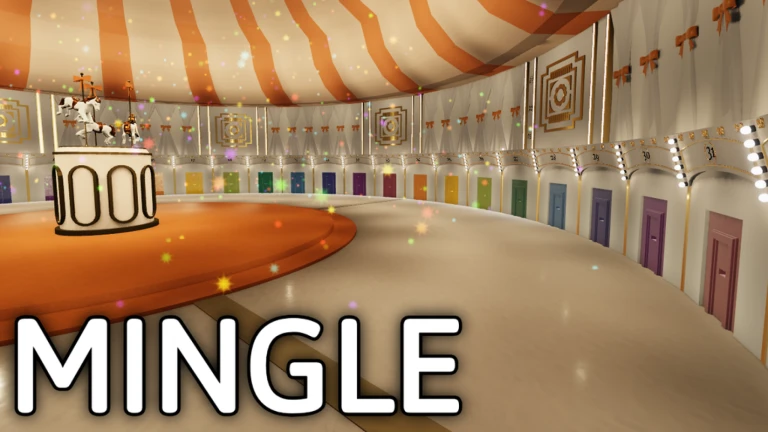What is Mingle Game?
The Mingle Game stands as a deadly musical chairs variant where players must form groups and find safety before time runs out. The Mingle Game represents the evolution of childhood games into lethal challenges, testing not just physical abilities but psychological resilience. Each Mingle Game round pushes players to their limits.
Form Groups
When music stops, quickly form groups matching the announced number
Race Against Time
Only 30 seconds to form groups and enter a safe room
Survive or Die
Wrong group size or failure to enter a room means elimination
Origins & Evolution
The Mingle Game emerged as one of the most psychologically intense challenges in Squid Game Season 2. Drawing inspiration from traditional team-building exercises and children's games, it transforms the innocent act of group formation into a deadly race against time.
Unlike other challenges that focus on individual skill, the Mingle Game forces players to navigate complex social dynamics while facing imminent death. The rotating platform and time pressure create an environment where trust becomes both essential and dangerous.
Psychological Elements
At its core, the Mingle Game is a study in human behavior under extreme pressure. Players must constantly evaluate and re-evaluate alliances, making split-second decisions that could mean life or death. The game's design deliberately creates scenarios where betrayal becomes a survival strategy.
The circular arena and the "Round and Round" song create a disorienting environment, adding to the psychological strain. Players must maintain mental clarity while dealing with the emotional trauma of watching others face elimination.
How the Mingle Game Works
Music Plays
Players move around a rotating platform while "Round and Round" plays
Music Stops
A number is announced - this is your group size target
Form Groups
Quickly find others to form a group matching the exact number
Enter a Room
Get your group into one of the surrounding rooms before time runs out
Critical Mingle Game Rules
Instant Elimination
- Wrong group size (too many or too few members)
- Failing to enter a room within 30 seconds
- Not finding a group when time expires
Survival Requirements
- Form a group with exactly the announced number
- Enter a room before the 30-second timer expires
- Stay with your group until the round ends
Essential Mingle Game Survival Tips
Stay Alert
Listen carefully for the number and start forming groups immediately
Be Flexible
Don't stick to one group - be ready to switch if numbers don't match
Position Smart
Stay near room entrances to minimize travel time when forming groups
Trust No One
Be prepared for betrayal - allies may abandon you to save themselves
Mingle Game Psychology & Group Dynamics
Alliance Formation
In each Mingle Game round, temporary alliances form and dissolve rapidly. Players often establish core groups of 2-3 trusted members, then adapt their numbers based on the announced target. This strategy provides a baseline of trust while maintaining flexibility in the Mingle Game's unpredictable environment.
Decision Making
The 30-second time limit forces rapid decision-making under extreme pressure. Players must balance multiple factors: group size, proximity to safe rooms, trustworthiness of potential allies, and the likelihood of betrayal. This cognitive load often leads to critical mistakes.
Emotional Impact
The psychological toll of the Mingle Game extends beyond each round. Survivors must cope with guilt from necessary betrayals and the trauma of witnessing eliminations. This emotional burden affects decision-making in subsequent rounds.
Advanced Mingle Game Strategies
Positioning Tactics
-
Maintain optimal distance from multiple safe rooms to maximize options
-
Stay within sight of potential group members while keeping escape routes open
-
Use the rotating platform's movement to your advantage when planning routes
Group Formation Strategies
-
Form loose alliances with players near multiple safe rooms
-
Identify and avoid players known for betrayal in previous rounds
-
Calculate group numbers quickly to avoid last-second scrambles
Critical Mistakes to Avoid
Overcommitment
Staying loyal to a group too long when numbers don't match the target can lead to elimination
Poor Timing
Waiting too long to start forming groups often results in panic and suboptimal decisions
Tunnel Vision
Focusing only on group formation while ignoring proximity to safe rooms is a fatal error
Frequently Asked Questions
Each Mingle Game round consists of two phases: the music phase and the grouping phase. When the music stops, you have exactly 30 seconds to form your group and enter a safe room. This time limit is strictly enforced - even being one second late means elimination.
Yes, you can switch groups at any time during the 30-second countdown in the Mingle Game. In fact, being flexible with group changes is often crucial for survival. However, once your group enters a safe room, you must stay together until the round ends.
The Mingle Game arena features 50 safe rooms arranged around the central platform. Each room can only hold one group, and once a room is occupied, its doors seal shut. Your entire group must be inside the room before the doors close, or those left outside face elimination.
In the Mingle Game, you face instant elimination if: your group size doesn't match the announced number exactly, you fail to enter a safe room within 30 seconds, or you're caught without a group when time expires. Additionally, attempting to force your way into an already occupied room results in immediate elimination.
Success in the Mingle Game requires a combination of strategies: maintain awareness of multiple safe rooms, form flexible alliances but be ready to switch groups, and position yourself strategically on the platform. Most importantly, never fully trust anyone - the Mingle Game's nature means alliances are always temporary.
The "Round and Round" song in the Mingle Game serves multiple purposes: it creates psychological tension through its contrast of innocent melody and deadly stakes, helps maintain the game's rhythm, and its sudden stops signal the start of group formation. The song has become iconic in Mingle Game culture, representing both childhood innocence and survival horror.
